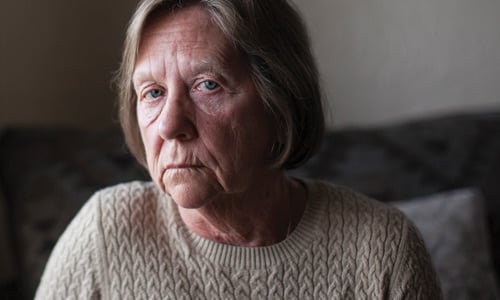
Carers Week
Luke Pilot, Campaigns Officer for Age UK, explains why it's so important to support carers - throughout Carers Week and always.

Luke Pilot, Campaigns Officer for Age UK, explains why it's so important to support carers - throughout Carers Week and always.
This Carers Week, the theme of which is making carers feel Visible, Valued and Supported, we look at measures that could make a real difference to the lives of unpaid carers, as the pressures of being unable to take a break pile up.
Carers Week is the largest annual celebration in the UK of unpaid carers and the immense contribution they make supporting people across the country. The past two and a half years have been especially challenging for carers, who have played a vital role in the lives of many older and disabled people who were left without access to care services. Many people became carers for the first time during this period, having to support a loved one disconnected from their own support services, friends and family. It’s impossible to put a value on the role of carers in our society, but in economic terms, it is estimated unpaid carers have contributed more than £400 billion since March 2020.
But the reality is that carers have always been providing this essential support to their families and friends, stepping in when no one else was would, and providing the support their loved ones needed. This often comes at the expense of their own wellbeing, as they endeavour to balance their other commitments, such as work and social lives. The pressures of the pandemic have only exacerbated these issue, and it has left carers to handle the legacy of the pandemic on their own.
In response to the 2021 Carers Leave Consultation, the Government committed to introducing a new employment right that would require employers to provide five days of unpaid carers leave to all employees. This welcomed proposal would have provided an essential lifeline for carers who desperately need the flexibility to care for loved ones without the worry of not being able to leave work to help. However, disappointingly, there was no such commitment to making this a for workers in an employment bill in the recent Queen’s speech.
While this would have been a major option of support by the Government, it is just one aspect of support that needs to be delivered as part of a broader package of support. That’s why Age UK, alongside Carers UK and other partners, are calling on the Government to design and deliver a properly funded respite and recovery plan this Carers Week.
This plan should cover the next 12 months and focus on protecting carers’ physical and mental wellbeing, through investment to deliver restorative breaks and support to help carers balance care with their other responsibilities, such as work. The plan must also provide financial support for carers, ensuring they receive maximum benefits, protecting them from the cost of living crisis and ensure carers are supported by local services to get the help they need.
With the necessary support in place, carers can begin to recover from the ongoing pressures of the past few years, and the many stresses and strains that already existed; and we can begin to build a National Carers Strategy to make sure this support is sustained and makes a real difference from 2023 onwards.
Rasila is clear on what carers need. “I have no life of my own. My sister is constantly on my mind. I need more support from the system to have some sort of life back.”
With 70% of older carers like Rasila reporting they have felt under strain, it’s clear what steps must be taken to ensure unpaid carers get the support they so desperately need. Age UK will continue the campaign to make sure this happens. Will you join us?
Write to your MP this Carers Week calling for a recovery and respite plan for unpaid carers.
In the UK, more than 2 million older people provide care for a loved one, approximately 1.1 million older carers also have their own long-term illness or disability and 120,000 older carers are over the age of 85. These older carers face the significant challenge of struggling to find any time to rest or find respite care for their loved one while they seek help for their own wellbeing.
This isn’t a new challenge, though. Many older carers have been struggling to take a break for years. Regular breaks should be a normal part of everyone’s everyday life. Yet many carers are now at breaking point because they simply do not get opportunities to rest and recharge.
Rasila Mehta, who cares for her sister who has dementia, knows all too well the challenges of balancing her many responsibilities and providing care for her sister. “I had to give up my full-time job working for American Express to take on board caring for my sister,” Rasila tells us. “Her condition deteriorated so rapidly that it wasn’t possible to carry on with my job.”
The impact of being a carer on Rasila’s life has been dramatic. “As a career-minded person, I was very strong, tough. I now still have to be assertive, but in a different way. I have to be a calmer person, too. I remember meeting my friends from my old workplace and they just said, ‘Everything in you has changed.’”
Rasila highlights how all-consuming the role of a carer can feel. “Sometimes I just want my own space to think. But I don’t have that. I can't even think about going out for dinner or lunch, or meeting with friends. Because I know that something will come up and I’ll have to cancel it.
“There’s nothing that makes things better. It’s constant. If you get a call, you’ve got to deal with it. Visits to the GP surgery, hospital stays. There’s no time for me.
“I used to love reading and used to love going to the library, going for walks. It’s all gone.”
The pressure of juggling these responsibilities without the chance to take a break is immense. Now, on top of these intense pressures, carers must also contend with the rising cost of living. While we are all feeling the impact of this crisis, carers must factor in the extra energy costs of powering necessary equipment as well as the fuel costs to make the journeys to care for their loved ones and take them to appointments. With food prices rising too, carers are finding themselves in a difficult financial position, especially if they must give up work like Rasila did, or their responsibilities mean they are restricted to low or fixed incomes.
If you're a carer like Rasila, we want to hear about your experiences of care. How do you balance your care responsibilities with other areas of your life? What are your biggest frustrations?

Rae Buttenwieser, Public Affairs Officer for Age UK, discusses why helping unpaid carers like Janet is so crucial.

A new report reveals the number of unpaid carers in the UK, and the levels of anxiety and loneliness they experience.

This Carers Week, Senior Campaigns Manager Eorann Lean explains why decision-makers have to take notice of carers.

Are we underestimating the threat of Brexit on social care.